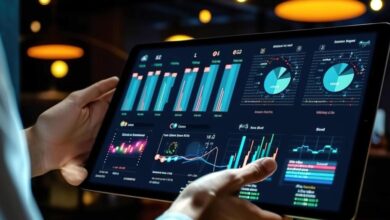Powering Decision-Making with AI in Data Analytics- DataScienceCentral.com


Image Credit: https://unsplash.com/photos/black-and-white-robot-toy-on-red-wooden-table-zwd435-ewb4
It is a widely known fact that in the current digital era, we generate and engage with data at an unprecedented rate. Think about it — every single post on social media platforms, online purchases, financial transactions, etc., continually contributes to the flow of information in our daily lives. Businesses are also collecting a lot of information from website visits, customer interactions, and other sources.
Nonetheless, just gathering information is not adequate — what I intend to say is that the genuine worth of information is acknowledged only through data examination and analysis. This analysis empowers businesses to navigate the vast number of datasets, identify hidden patterns and trends, and derive meaningful insights from said data.
As you can imagine, these insights are crucial for operating businesses today. Yet, the sheer volume and complexity of modern data can quickly mean traditional analysis methods are not sufficient. This is where artificial intelligence (AI) comes in, offering organizations a strong solution to assist with access to further insights covered within their information and data. That, folks, will be the primary focus of this blog.
What is AI in data analytics?
Combining traditional data analysis with AI and machine learning, AI in data analytics, a.k.a. AI-driven or augmented analytics, automates data cleaning and anomaly detection tasks. This, in turn, helps uncover hidden patterns in large datasets. It also empowers predictive modeling and delivers insights by finding patterns and relationships, improving proficiency, precision, and so much more. Data analytics is further revolutionized by machine learning, natural language processing, and computer vision.
Top AI benefits for data analytics
- Accuracy and precision: By automating tasks such as data manipulation and cleaning, tasks that are typically susceptible to human error, AI helps improve the precision and accuracy of data analytics. This automation also helps limit the mistakes and lifts by and large examination exactness. Additionally, AI algorithms can analyze data points with a much higher level of precision than human beings are capable of. This, in turn, results in substantially more nuanced insights along with a lower likelihood of one missing or omitting crucial details.
- Faster data processing: AI has also come to play an important role in speeding up data processing by productively dealing with enormous datasets that would otherwise take significantly longer to deal with, especially while utilizing traditional techniques and methods. This means when a company needs real-time insights, AI’s rapid processing of data allows for quicker analysis and better decision-making.
- Real-time analysis: AI also helps companies with data processing in real-time by handling information streams quickly, doing away with delays that have been rendered normal in conventional data analysis processes. This immediate insight, in turn, makes it possible to take more immediate actions, which is especially helpful for things such as detecting fraud, keeping an eye on the stock market, and optimizing website traffic based on user behavior.
- Personalized recommendations: AI also makes it easier to understand complex data sets than traditional charts and graphs. It can achieve this impact by automatically creating clear, personalized visualizations highlighting important trends and patterns. Users, even those who do not have a strong background in data analysis, can better comprehend the data as well as identify key insights thanks to these visualizations.
There you have it, folks — some of the many, many ways in which AI stands to boost data analytics. Now, all you need to do is find a trusted and experienced data analytics services company. With their support, you can put AI to work for your data analytics in no time.



